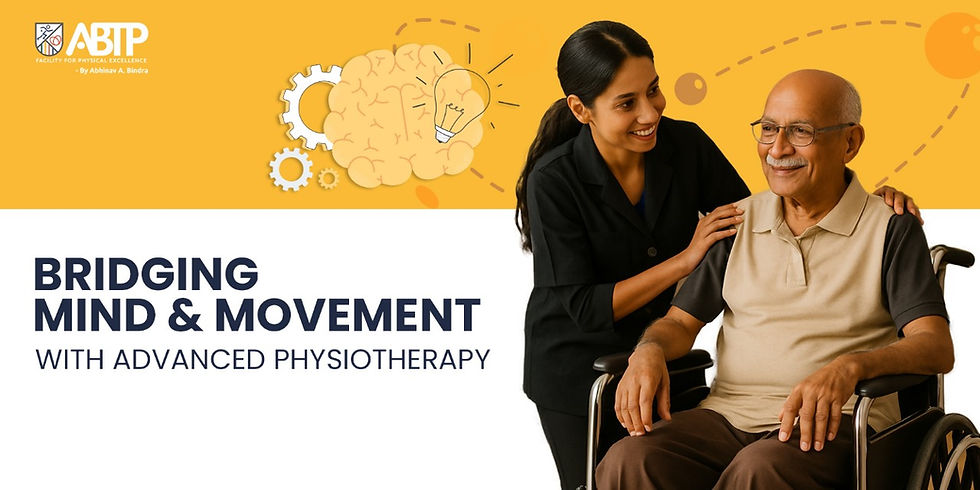Physiotherapy Interventions to Tackle Chronic Fatigue
- May 12, 2025
- 3 min read
CHRONIC FATIGUE SYNDROME (CFS) also known as MYALGIC ENCEPHALITIS (ME), is a complex, debilitating condition characterized by extreme fatigue that doesn’t even improve with rest and often gets worsened with physical and mental activity. For many, it interferes with work, relationships, and everyday functioning. Studies by the National Institute of Health suggest that this condition is more prevalent in women in India. Nearly 1 of 8 women experiences chronic fatigue.

Before diving into the details, it is necessary to understand 1. The Causes 2. The Symptoms 3. Physiotherapy Interventions
CAUSES
The causes of chronic fatigue syndrome are idiopathic but a combination of various factors can be involved:
GENETICS—CFS appears to run in families, so some people may be born with a higher likelihood of developing the disorder.
INFECTIONS—Some people develop CFS symptoms after being affected by a bacterial or viral infection, especially when afflicted by Epstein-Barr virus (EBV), human herpesvirus (HHV)-6, or human parvovirus B19. These infections target the onset of CFS.
PHYSICAL OR EMOTIONAL TRAUMA—Some people report the experience of an injury, surgery, or significant emotional stress shortly before their symptoms began.
As per the studies by NIH, the most common risk factors include older age, socioeconomic deprivation, and gender-based disadvantages—particularly marital sexual violence accompanied by some common mental disorders as well.

SYMPTOMS
Symptoms may vary from person to person and the severity of symptoms can fluctuate from day to day. In addition to fatigue, symptoms may include :
Extreme exhaustion after minimal physical or mental activity
Post-exertional malaise (PEM) triggered even by routine tasks
Cognitive issues: poor memory, reduced attention span, difficulty in multitasking
Poor postural control, especially when changing positions
Chronic headaches
Joint Pain which is associated with autoimmune conditions like rheumatoid arthritis (RA)
Disturbed / Inadequate Sleep, leading to morning fatigue
Decreased ability to work or function
Anxiety or panic attacks

PHYSIOTHERAPY INTERVENTIONS
Physiotherapy may not offer a direct cure for CFS, but it plays a vital role in enhancing the daily function, managing pain, and guiding safe activity levels. The goal is not to push the body but to gently support it—helping patients re-engage with life on their terms without triggering flare-ups.

PACING AND ENERGY MANAGEMENT –
One of the most important principles in managing CFS is PACING—a strategy that involves planning and balancing activities to avoid overexertion and minimize PEM (Post Exertional Malaise).
Physiotherapists help patients by –
1. Prioritizing tasks based on energy levels
2. Including regular rest periods
3. Breaking activities into smaller & manageable steps
4. Use assistive devices like shower chairs and mobility aids when necessary.
5. Maintaining Track of muscle function with regular assessments at ABTP
GRADED ACTIVITY AND MOVEMENT THERAPY—
Contrary to traditional exercise programs, physiotherapy for CFS involves low-intensity, personalized movement plans. These are introduced gradually and adaptively, considering how the body responds day to day. Therapy may include
1. Gentle stretching routines.
2. Deep Breathing and relaxation exercises
3. Basic strengthening using body weight or light resistance
4. Light Aerobic activities like short walks
5. Gentle neuromuscular training
6. Balance & Proprioceptive training at ABTP to reduce the risk of falls
The purpose is not rapid fitness gain but to preserve mobility, prevent deconditioning, and improve circulation - all while avoiding symptom flare-ups.
PAIN AND POSTURE MANAGEMENT—
Many CFS patients complain about chronic muscle aches, joint pain, and poor posture. Our Experts at ABTP employ techniques that target soft tissue health as well as biomechanical alignment.
Techniques used to address these concerns are:-
1. Myofascial release
2. Therapeutic massage
3. Postural training to reduce strain on muscles
4. Stretching exercises
5. Heat & Cold Therapy for Symptomatic relief
SLEEP AND STRESS SUPPORT
Since sleep dysfunction and stress are deeply intertwined with CFS, our physiotherapists also emphasize relaxation and parasympathetic activation.
Physiotherapists may help by
1. Relaxation therapy (such as progressive muscle relaxation or diaphragmatic breathing)
2. Guided movement routines which ultimately aim at promoting sleep quality
3. Mindfulness based movement (like gentle yoga)
4. Bedtime posture advice
These practices help patients better manage the stress-fatigue cycle and promote parasympathetic nervous system activation for restorative rest.
Conclusively, Chronic Fatigue Syndrome is more than simple tiredness and we at ABTP understand that this condition is complex and life-altering. But we, at ABTP with a multidisciplinary care approach, stand as a cornerstone in helping you restore the quality of life of the individuals.





Comments